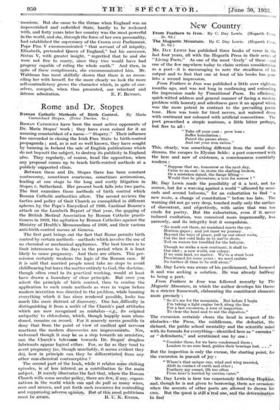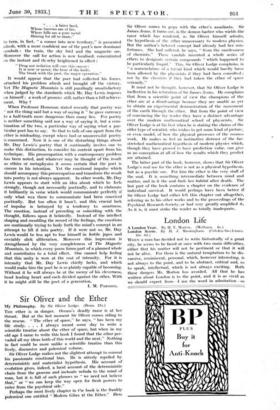New Country:
From Feathers to Iron-. By C. Day 'Lewis: (Hogarth Press. 38. fid.) .
Mn. PAY LIKwis has published, three books of verse in the last four years, all with the HOgarth Press in their series of "Living Poets." As one of the most 'lively.' of these—and one of the few anywhere today to claim serious consideration as a poet—it is encouraging to note the steadiness of his output and to find that one at least of his books has gone into a second impression.
From Feathers to Iron was published a little over eighteen months ago, and was not long in confirming and extending the impression made by Transitional Poem. Its efficiency, quick-witted address and general manner of facing a modern problem with honesty,and adroitness gave it an appeal -which was the more potent in contrast to the prevailing poetic tone. Here was tonic for tired nerves, not watered down with sentiment nor coloured with artificial concoctions. The poet prescribed a simple nostrum, a little bitter perhaps,
but free to all : •
"Take off your coat : grow lean : Suffer humiliation : Patrol the passes alone, And eat your iron ration."
This, clearly, was something different from the usual day- dreams, the escapes to Elysian fields : a poet concerned with the here and now of existence, a consciousness essentially modern :
"Suppose that we, tomorrow or the next day, Came to an end—in storm the shafting broken, Or a mistaken signal, the flange lifting— Would that be premature, a text for sorrow ? "
Mr. Day Lewis made the possibility of it a text, not for sorrow, but for a warning against a world " officered by semi- cads and second baboons," for an exhortation to find a new route, a change of constitution" before, too late. The warning did not go very deep, touched really, only the surface of discontent, and objectively., 'with .satire that was. too IFFYde for poetry. But the exhortation, even if it...never induced exaltation, was conceived, more impersonally, .less narrowly, and its integrity :lentit compulsion.-, "No mark out there, no mainland meets the eye.- Horizon gapes ; and yet must we journey ... Beyond the bays of peapS, pull up our sweet. roots, Cut the last cord links us to native shore, -Toil on waters too troubled for the -halcyon. - Though we strike a new continent,-it shall be Our islet ; a new world, our colony. If we miss land, no matter. We've a stout boat Provisioned for some years : we need endure
• No further ill than to be still alone." • - .
Mr. Day Lewis was aware of his predicament, had foeussed it and was seeking a solution.' 'He was already halfway to being a poet. • - From Feathers to Iron Was followed recently' by The Magnetic Mountain, in which the author develops his theme in a stricter framework, elaborating the constituent elements more precisely : ,•.
"So it's me for the mountain. But before I begin
I'm taking a light engine back along the line- - For a last excursion, a tour of inspection, To clear the head and to aid the digestion." ,
The 'excursion certainly clears the head in respect of the obstacles--the Press, the Middleman, the defeatist, the
diehard, the public school mentality and the scientific mind with its formula for everything—identified here as " enemies " or "defendants," and scrutinized one by one :
"Consider these, for we have condemned them ;
Leaders to no sure land, guides their bearings lost. ...."
But the inspection is only the excuse, the starting point for the excursion in pursuit of joy : "Where's that unique one, wind and wing marriedo Aloft in contact of earth and ether ; . Feathery _my.comet, ph too often From heav'n harried by carrion cares."
- Mr. Day Lewis is here too consciously following Hopkins, and, though he is not given to borrowing, there aze occasions when the accents of other poets -are allowed to drown- his
own But the quest is still a' real one, and the determination to find
" . . . a fairer land, Whose furrows are of fire, Where hills are a pure metal Shining for all to share."
to turn, in fact, "a corner into new territory," is presented afresh, with a more confident use of the poet's now dominant symbols: the train, the sky bird and the magnetic ore. Moreover the call for action is now localised, concentrated on the instant and Urreby heightened in effect : "Drug nor isolation will cure this cancer : It is now or never, the hour of the knife,
The break with the past, the major operation."
It would appear that the poet had collected his forces, attacked his problem afresh and brought off the victory. Yet The Magnetic Mountain is still puzzlingly unsatisfactory when judged by the standards which Mr. Day Lewis imposes
on himself : a work of promise still, rather than a full achieve- ment. Why ?
When Professor Housman stated recently that poetry was
not the thing said but a way of saying it" he gave currency to a half-truth more dangerous than many lies. For poetry is neither something said nor a way of saying it, but a com- bination of the two, a particular way of saying what a par- ticular poet has to say. So that to talk of one apart from the other is misleading, except where bad or unsuccessful poetry is concerned. Now it is one of the disturbing things about Mr. Day Lewis's poetry that it continually invites one to make this distinction, to consider his content apart from his technique. His preoccupation with a contemporary problem has been noted, and whatever may be thought of the result as ethics or metaphysics it seems certain that the poet is sincere in his intention. Yet the emotional impulse which should accompany this preoccupation and transform the result into poetry is not always apparent. In other words, Mr. Day Lewis appears to start with an idea about which he feels strongly, though not necessarily poetically, and to elaborate it brilliantly in veise Which would communicate perfectly if only what was there to communicate had been conceived poetically. But too often it hasn't, and this crucial lack of impulse is betrayed by a tendency to smartness. The emotion, instead of preceding or coinciding with the thought, follows upon it belatedly. Instead of the intellect shaping and moulding the record of the feelings, the emotions are continually trying to body forth the mind's concept in an attempt to lift it into poetry. If it were not so, Mr. Day Lewis would be less apt to lose himself in fertile japes and enviably slick alliteration. Moreover this impression is strengthened by the very completeness of The Magnetic Mountain, in which every poem forms part of a planned whole and contributes to a total effect. One cannot help feeling that this unity is won at the cost of intensity. For it is intensity that Mr. Day Lewis chiefly lacks, and which would make him the poet he is so plainly capable of becoming. Without it he will always be at the mercy of his cleverness, head leading heart and each divided against the other. With it he might still be the poet of a generation.
I. M. PARSONS.











































 Previous page
Previous page